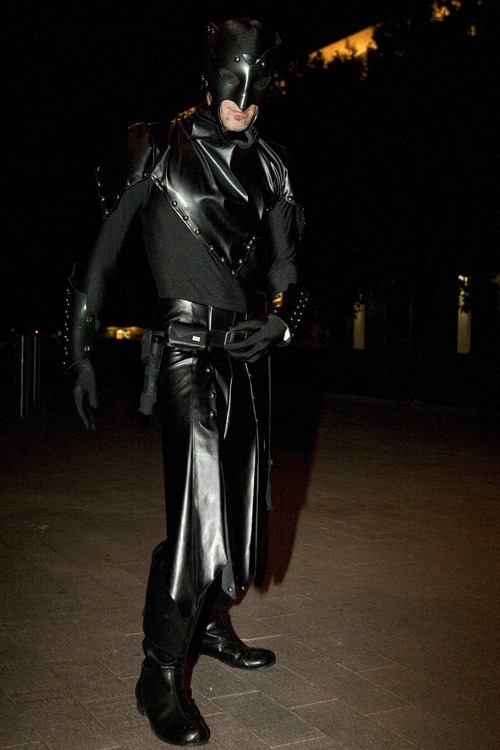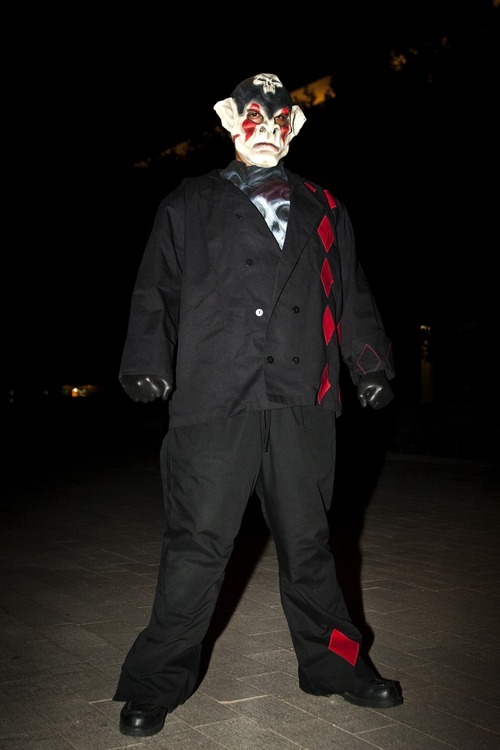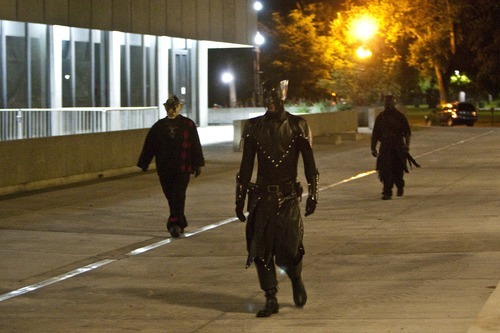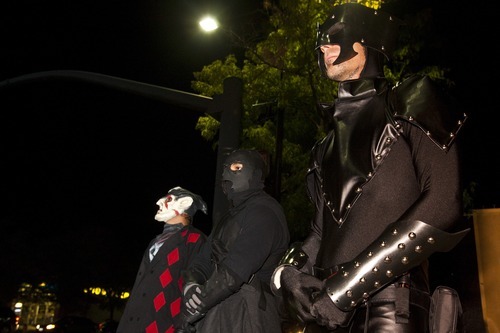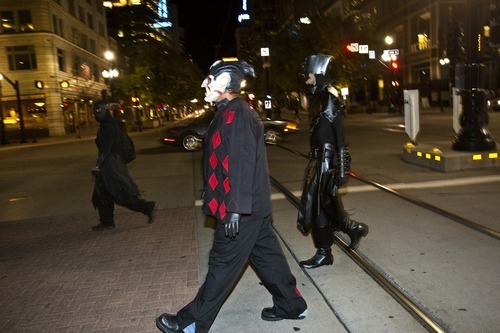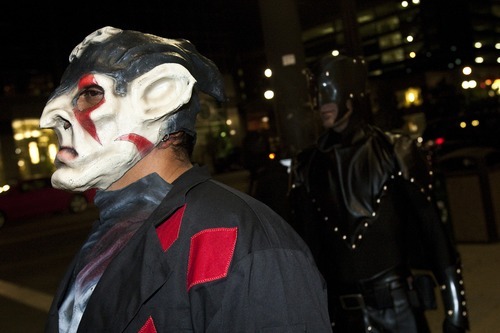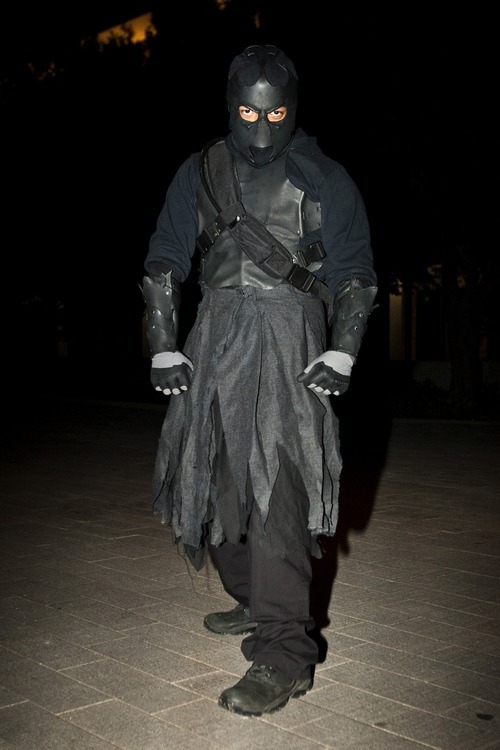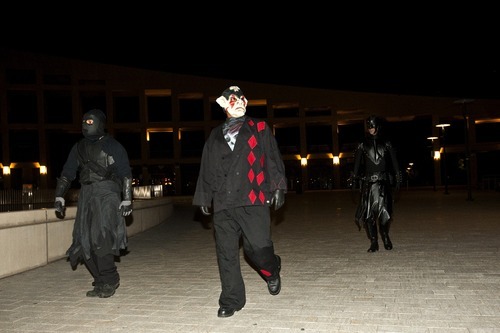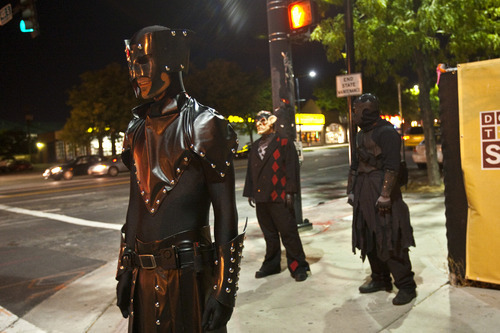This is an archived article that was published on sltrib.com in 2011, and information in the article may be outdated. It is provided only for personal research purposes and may not be reprinted.
Dusk is descending upon Salt Lake City.
As the shadows elongate and the sun sinks behind the Oquirrh Mountains, they take to the streets.
The costumed avengers start at the Salt Lake City Library and fan out. Always in groups of at least two, they are on the lookout for trouble.
They happen upon a mother and grown son in a screaming match on their front lawn.
Calmly, the masked men walk into the fray, saying nothing.
The son backs down, gets in his car, and tells his mother he'll be back later.
They're not millionaires out to avenge their parents' deaths and none of them has been bitten by a radioactive spider. Nevertheless, they say they are helping in situations like the one they described above.
Most of them are tattoo artists from Ogden who claim they are atoning for past lives that include alcoholism, gang life and being the muscle for drug dealers. Others say they do social work or lease apartments and just wanted a unique way to do service.
The group, called the Black Monday Society, formed about five years ago when founder Dave Montgomery, who started calling himself Insignis but recently has changed to Nihilist, had stopped drinking for about six months. He found the members of the Society through a website claiming to bring together real-life superheroes and met with some who lived in Utah. Within six weeks, they were roaming the streets.
"It was as addictive as any drug," said Montgomery, who dresses in black leather with silver studs. "You fall into a whole other self."
The name comes from the idea of being able to turn someone's bad day into a good day, he said.
The group started with just two people, but quickly grew, peaking at 19 members, all of whom came with their own uniforms, superhero name and backstory worthy of any comic book. Nearly everyone in the society has a tattoo that's given after completing a certain number of patrols.
But when it's real life — balancing families, significant others and jobs — the burnout rate is high.
The group now has nine men who patrol downtown Salt Lake City at least a couple of times a month, but they are careful to distinguish themselves from what people see in the new Batman series or the movies "Kick-Ass" and "Watchmen."
"Those movies have done more damage to the real-life superhero community than anything else," said Mike Gailey, the 6-foot-1-inch, 245-pound man who goes by Asylum. "You can't just go out and beat someone up for jaywalking."
In the five years they've been together, they've never come to blows with anyone, they said. A check of Utah court records shows no criminal history for any of the members in the state.
Usually, they say, just their presence is enough to startle someone into thinking clearly again or calm down a situation where people are engaged in a shouting match or fighting. Much of the time, they're helping a person passed out from too much drinking find his way home or bringing food to homeless people.
Gailey says the group serves as an extra set of eyes and ears for the police. They do carry pepper spray, high-decibel whistles and Tasers, but they've never had to use any of them, he said.
The Salt Lake City Police Department is familiar with the society and the work it members do. The department doesn't look at them as criminals or vigilantes, said Detective Dennis McGowan, but also can't vouch for them because they have not received the training that, for example, conventional Neighborhood Watch groups have received.
"We've never had a problem with the Black Monday Society, but it's our watch groups that we know are properly trained and know how to alert police to a problem," McGowan said.
Gailey claims he joined after serving as a guy who collected debts across the state "one way or another" for drug dealers. After being the one called in to identify the bodies of three close friends who died in drug-related incidents, and losing a few more, he said he realized he needed to change. He made some of those changes, including starting a family, and began working with Montgomery at Frankie's Tattoo Parlor in Clearfield, which serves as the group's de facto Batcave, about the same time he joined the society.
"It's my way to give back to people I had helped hold back," he said.
Wally Gutierrez claims he left behind the gang life as a teenager in Kansas after his friend was stabbed multiple times and his mother decided to uproot him and his younger brother for a new start in Utah. The now-30-year-old has four kids and doesn't see much time as Fool King anymore. The same goes for some of the other original members.
That's where the younger generation comes in to play.
They are about half the size of their mentors, and they don't share their troubled pasts. They just wanted to find a way to express themselves while giving back to their community, said Roman Daniels, who dresses his 5-foot-7, 150-pound frame as Red Voltage.
"We're trying to do some good out there," said the 23-year-old Sandy resident who began patrolling April 2010, often toting bags of bottled water, snacks and toiletries. He is now the official leader of Black Monday Society. Montgomery is leading a new branch called Doomwatch.
Another member, who didn't want to be named for fear of reprisal at his job where he works with disabled adults, but dresses as Iron Head for his patrols, said he also will remove graffiti in his neighborhood in Kearns.
"A lot of us got into it because we're trying to make up for something in our past," Gailey said. "These guys got into it because they have a love of justice. They're just great, pure-hearted guys."
Daniels and his fellow society members have broken up their share of fights, including times when he's had to call police to report a crime and detaining people who have committed crimes.
But alerting police to a problem as they patrol random streets is no longer enough for some members of the society.
About a month ago, Montgomery started what he calls a more "vengeance-based, tactical" branch named Doomwatch. They're working with an official bounty hunter to learn laws and tactics, and they plan to be in high-crime areas so they can "take a more hands-on approach" and intervene in more altercations.
"I don't want heroes just to be an urban legend," Montgomery said. "I want people to see us and say there are real superheroes in the world."
Twitter: @sheena5427 —
Calling all
heroes
O You don't need a bat signal or a red phone to reach members of the Black Monday Society. Find out more online. > blackmondaysociety.webs.com


